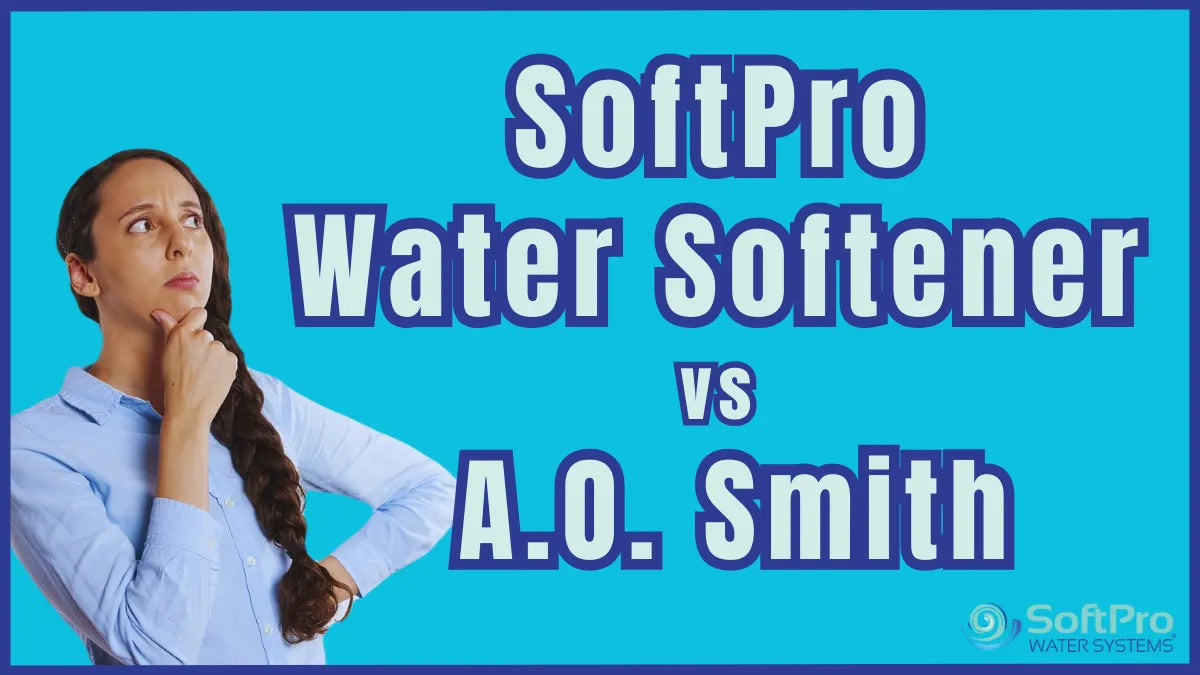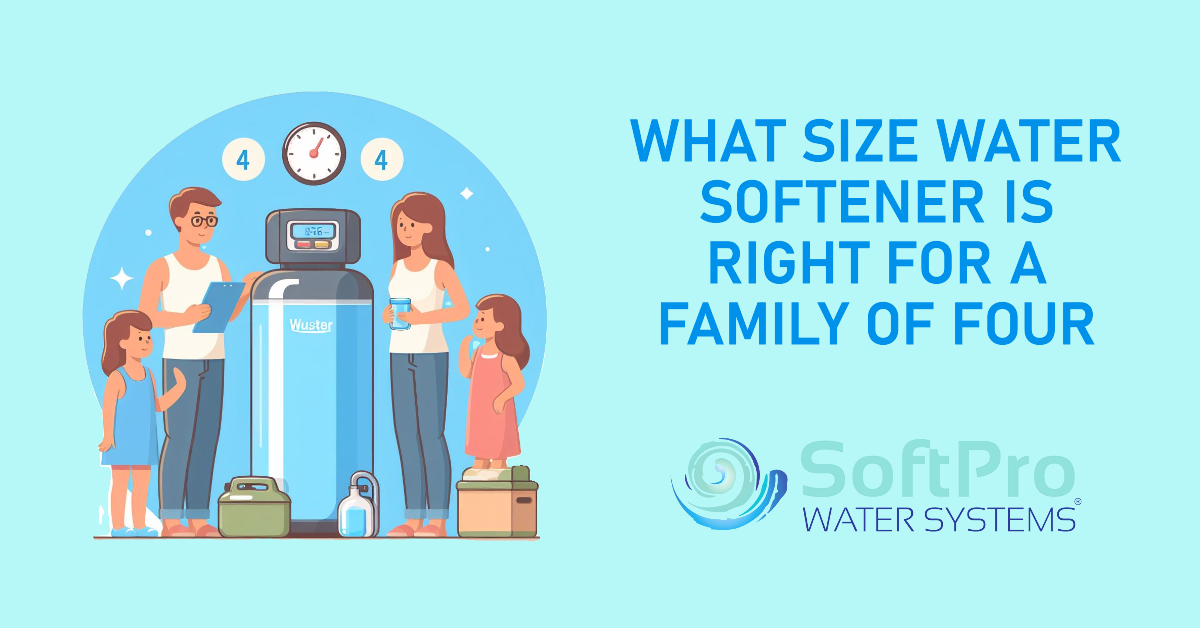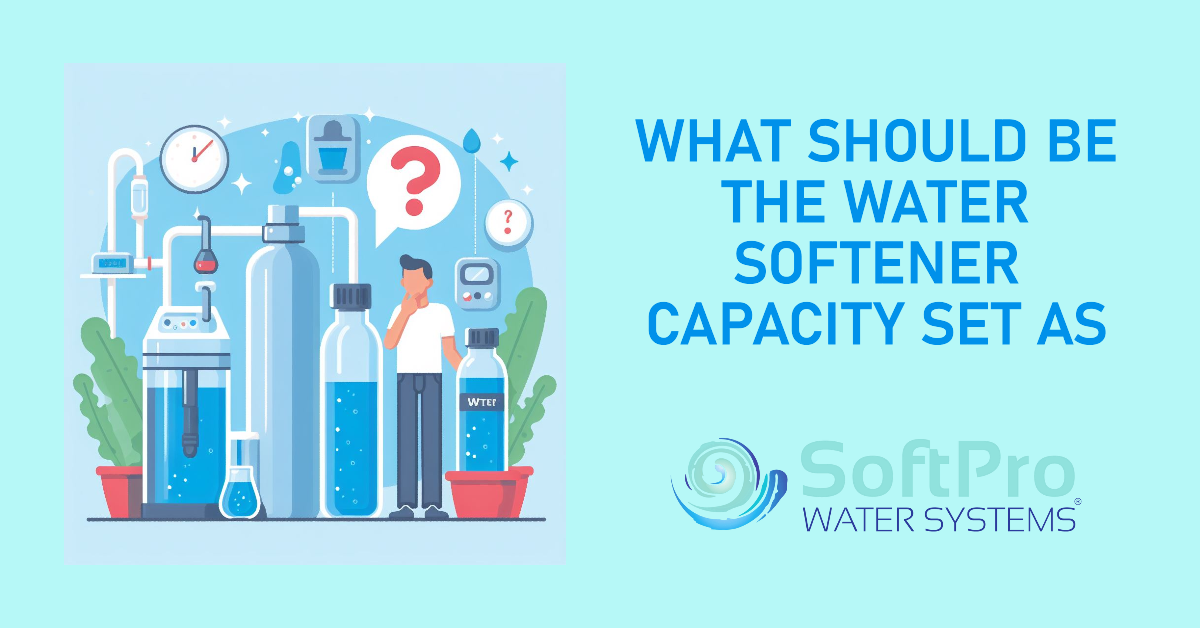SoftPro vs A. O. Smith: Performance, Features, Cost Comparison
Table of Contents
Choosing the right water softener can significantly improve your home's comfort, protect appliances, and save money. However, with options like SoftPro and A. O. Smith vying for your attention, navigating the market can be daunting. This guide delves into the world of these two leading brands, demystifying their functionalities, reputations, and suitability for your specific needs.
Introducing SoftPro and A. O. Smith Softeners
- SoftPro: A relatively new contender in the water softener arena, SoftPro focuses on innovative technology and user-friendly designs. Their softeners boast high grain capacities, efficient flow rates, and smart features like Wi-Fi connectivity and leak detection.
- A. O. Smith: A well-established brand with over 140 years of experience, A. O. Smith is renowned for its reliability and durability. Their water softeners come in a diverse range, catering to various household sizes and budget constraints, known for their solid performance and dependable customer service.
The Science Behind the Softening
Both SoftPro and A. O. Smith utilize ion exchange technology, the gold standard for water softening. This process involves passing hard water through a resin bed containing sodium ions. The calcium and magnesium responsible for hardness swap places with the sodium, resulting in soft, scale-free water.
Reputations That Matter
- SoftPro: While still building their brand recognition, SoftPro has garnered positive buzz for its sleek designs, advanced features, and competitive pricing. Early user reviews commend its ease of installation and intuitive controls.
- A. O. Smith: With a long-standing reputation for excellence, A. O. Smith is consistently ranked among the most trusted water softener brands. Customer testimonials tout their longevity, performance consistency, and reliable customer support.
Now, we delve deeper into the specifics, comparing their performance, features, cost-effectiveness, and installation nuances. By the end of this journey, you'll be empowered to make an informed decision, choosing the softener that perfectly aligns with your home's needs and budget.
Evaluating Your Need for a Water Softener
Before diving into the specific strengths and weaknesses of SoftPro and A. O. Smith, let's first assess whether a water softener is even necessary for your home. Understanding your water hardness level and its impact is crucial in making informed decisions.
Recognizing Hard Water
- Symptoms: Soap scum buildup, scale formation on faucets and appliances, dry and itchy skin after showering, and decreased appliance efficiency are telltale signs of hard water.
- Testing: Home water hardness test kits or professional water analyses provide accurate measurements.
The Threshold of Tolerance
Once you know your water hardness level, consider the following:
- Softness Scale: Ranges from 0 to 250 parts per million (ppm) of calcium carbonate (CaCO3). Typically, below 60 ppm is considered soft, 60-120 ppm moderately hard, and above 120 ppm hard.
- Impact on Comfort and Appliances: Softer water improves both. For example, at 200 ppm, you'll use 25% more soap and experience significantly more scale buildup compared to 50 ppm.
SoftPro vs. A. O. Smith: Grain Capacity and Flow Rate Showdown
- Grain Capacity: Measured in grains (one grain equals 17.1 milligrams of hardness), this metric indicates the total amount of hardness a softener can remove before regeneration is needed. A higher capacity is crucial for large households or areas with exceptionally hard water.
- SoftPro: Offers models with capacities ranging from 24,000 to 60,000 grains, catering to diverse needs.
- A. O. Smith: Provides a wider range, from 16,000 to 100,000 grains, ensuring options for even the most challenging water conditions.
- Flow Rate: Indicates the amount of water the softener can handle per minute. Higher flow rates are essential for homes with multiple water sources or high water usage.
- SoftPro: Generally boasts faster flow rates, reaching up to 15 gallons per minute (GPM) in some models.
- A. O. Smith: Flow rates tend to be slightly lower, typically ranging from 5 to 12 GPM, but still sufficient for most household needs.
Both SoftPro and A. O. Smith offer a variety of capacities and flow rates to address diverse water hardness levels and household water usage. Carefully assess your specific needs and water conditions to determine the optimal capacity and flow rate for your softener.
Scale Buildup and Hardness Reduction
Now that we've assessed your water situation and explored softener capacities and flow rates, let's delve deeper into the heart of the matter: how effectively do SoftPro and A. O. Smith tackle the scourge of hard water and its associated scale buildup?
Water Hardness Reduction
Both brands utilize the renowned ion exchange technology, where hard water flows through a resin bed containing sodium ions. These ions swap places with the magnesium and calcium causing hardness, effectively transforming the water into a softer state. However, subtle differences in technology and efficiency can make a significant impact.
- SoftPro: Some models employ advanced resin technologies like high-capacity Purolite® resin, promising efficient hardness removal with minimal salt usage. Additionally, their demand-regenerating systems only initiate regeneration cycles when necessary, further optimizing salt consumption and operating costs.
- A. O. Smith: Known for their reliable and consistent performance, A. O. Smith water softeners often feature time-based regeneration cycles, which may lead to slightly higher salt usage compared to demand-based systems. However, their traditional valve technology and sturdy construction ensure long-lasting performance and minimal breakdowns.
Independent Testing and User Experiences
- Independent Testing: Several independent water quality labs have conducted hardness reduction tests on both brands. While results can vary across models and water conditions, reputable labs like NSF International have generally reported excellent performance from both SoftPro and A. O. Smith, with hardness reduction exceeding 90% in most cases.
- User Experiences: Customer reviews also offer valuable insights. SoftPro users often praise the effectiveness of their softeners in eliminating scale buildup and improving water quality, particularly in regions with very hard water. A. O. Smith users typically highlight the consistent performance and long-lasting effectiveness of their softeners, even in demanding environments.
Both SoftPro and A. O. Smith excel at hardness reduction, delivering significant improvements in water quality and scale minimization. SoftPro's advanced technology and demand-based regeneration systems might offer potential advantages in salt efficiency, while A. O. Smith's time-based systems prioritize consistent performance and long-term reliability. Ultimately, the choice depends on your priorities: prioritizing upfront cost and potentially lower salt usage with SoftPro, or valuing long-term reliability and consistent performance with A. O. Smith.
Feature Showdown
Having conquered the battlefield of hardness reduction, we now turn our attention to the realm of additional features that elevate a water softener from functional to truly enriching. This feature showdown aims to equip you with the knowledge to choose the brand that best compliments your lifestyle and technological preferences.
Filtration Fortification
- SoftPro: Many SoftPro models boast built-in sediment and chlorine filtration, offering an extra layer of water purification that protects appliances and improves taste. Some higher-end models even include reverse osmosis filtration for exceptional purity.
- A. O. Smith: While some A. O. Smith models offer sediment filtration, chlorine reduction typically requires external filtration systems. However, some models feature advanced features like ultraviolet (UV) disinfection, eliminating bacteria and enhancing water safety.
Smart Home Symphony
- SoftPro: Several SoftPro softeners embrace the smart home revolution, offering Wi-Fi connectivity and mobile app control. This allows you to monitor water usage, schedule regeneration cycles, and even receive leak alerts remotely.
- A. O. Smith: While not as widespread as with SoftPro, select A. O. Smith models also feature Wi-Fi connectivity and app control. However, their focus tends to be on performance monitoring and data analysis, with less emphasis on remote control functionality.
Warranty Whispers
- SoftPro: SoftPro offers standard warranties ranging from 5 to 10 years on parts and labor, with extended warranties available for purchase.
- A. O. Smith: A. O. Smith boasts longer standard warranties, typically ranging from 6 to 12 years on parts and labor, reflecting their confidence in their product's durability. Additionally, some of their high-end models come with lifetime warranties on specific components like the tank.
If cutting-edge features, smart home integration, and multiple filtration options are high on your priority list, SoftPro might be the perfect match. However, if you prioritize long-term reliability, comprehensive warranties, and a focus on core softener functionality, A. O. Smith's offerings might be more appealing. Ultimately, the ideal feature set depends on your individual needs and technological preferences.
Cost and Value Analysis: Finding the Best Investment
Now that we've thoroughly compared the performance and features of SoftPro and A. O. Smith water softeners, let's shift gears and analyze the crucial aspect of cost and value. Choosing the right softener is not just about upfront price, but also about ongoing operational costs and your potential return on investment.
Price
- SoftPro: Generally falls within the mid-range to high-end price bracket. Initial purchase costs can vary significantly depending on model capacity, features, and technology. However, some argue that their advanced features and potentially lower salt usage over time can offset the higher initial cost.
- A. O. Smith: Offers a wider range, encompassing budget-friendly options and premium models with advanced features. Their reputation for durability and long-lasting performance often justifies their price point for some consumers.
Operational Cost
- Salt Consumption: As both brands utilize ion exchange technology, salt is a key operational cost. SoftPro's demand-based regeneration systems might lead to lower salt usage in the long run, while A. O. Smith's time-based systems may require more frequent salt refills. Water hardness and softener usage also significantly impact salt consumption.
- Electricity Usage: Both brands generally have comparable energy consumption, although specific models may differ slightly. Consider efficiency ratings when making your choice.
- Maintenance Needs: Both brands require regular maintenance, primarily filter replacements and periodic system cleans. SoftPro's advanced filtration systems might require more frequent filter changes compared to A. O. Smith.
Return on Investment (ROI)
- Appliance Lifespan: Softer water significantly reduces scale buildup, extending the lifespan of appliances like dishwashers, washing machines, and water heaters. This cost savings can outweigh the initial investment over time.
- Improved Plumbing Efficiency: Hard water can clog pipes and decrease water flow, requiring plumbing repairs. Softer water minimizes these issues, potentially saving on future plumbing costs.
- Enhanced Comfort and Health: Softer water is gentler on skin and hair, reduces soap scum buildup, and improves overall water quality. These factors contribute to increased comfort and potential health benefits, which are difficult to quantify but certainly valuable.
Choosing the most cost-effective option requires a personalized analysis of your needs and priorities. If maximizing upfront savings is crucial, some A. O. Smith models might be ideal. However, if you value long-term cost savings through potentially lower salt usage and appliance protection, SoftPro might be a better investment. Remember to factor in operational costs, maintenance needs, and potential ROI based on your water usage and appliance lifespan.
Installation and Maintenance: DIY vs. Professional Help
With the cost and value factors weighed, we now turn our attention to the practicalities of bringing your chosen water softener to life. Installation and maintenance considerations can significantly impact your experience, so let's delve into the DIY and professional assistance options for both SoftPro and A. O. Smith softeners.
Installation
- SoftPro: Many SoftPro models boast user-friendly designs and clear installation manuals, catering to the DIY enthusiast. Some even offer video tutorials and online support. However, complex models or challenging plumbing configurations might necessitate professional help.
- A. O. Smith: While some A. O. Smith models are also DIY-friendly, their wider range includes complex units requiring professional installation expertise. Their website clearly indicates which models require professional assistance.
DIY Toolkit
For those embracing the DIY route, here's a basic toolkit breakdown:
- Basic plumbing tools: Wrenches, pliers, pipe cutters, etc.
- Teflon tape or pipe dope: For sealing connections.
- Electrical tools (if applicable): For models with smart features.
- Safety gear: Gloves, eye protection.
Professional Installer
Hiring a licensed plumber offers several benefits:
- Expertise: Ensures proper installation, minimizing leaks and maximizing performance.
- Warranty Protection: Some warranties require professional installation for full coverage.
- Peace of Mind: Leaves the technical work to the experts, allowing you to relax and enjoy softer water.
Maintenance
Both SoftPro and A. O. Smith require regular maintenance:
- Salt refilling: Frequency depends on water hardness and usage.
- Filter replacements: Varies depending on filter type and model.
- System cleaning: Typically annual or biannual.
DIY Maintenance or Pro Checkups?
- Basic tasks: Refilling salt and changing simple filters can be DIY projects.
- Complex tasks: System cleaning, troubleshooting, and repairs are best left to professionals.
Your comfort level with DIY tasks, budget constraints, and the complexity of your chosen model will determine whether professional installation and maintenance are necessary. SoftPro's user-friendliness makes DIY more feasible for some models, while A. O. Smith's wider range might necessitate professional help for certain units. Remember, investing in professional expertise can ensure proper installation, protect your warranty, and give you peace of mind.
Brand Reputation and User Feedback: Weighing the Opinions
As you near your final decision, it's crucial to consider the whispers of the crowd – brand reputation and user experiences. Both SoftPro and A. O. Smith have established themselves in the water softener market, but their strengths and weaknesses might resonate differently with various audiences. So, let's tap into the collective wisdom to gain further insights.
The Reputation Rundown
- SoftPro: A rising star in the water softener arena, SoftPro has garnered praise for its innovative technology, user-friendly designs, and competitive pricing. However, their shorter track record compared to A. O. Smith means their brand recognition and customer base are still growing.
- A. O. Smith: A titan of the industry, A. O. Smith boasts a 140-year legacy built on reliability, durability, and consistent performance. Their customer reviews often highlight long-lasting softeners, efficient service, and overall satisfaction.
User Feedback
- SoftPro: Early user reviews comments SoftPro's ease of installation, intuitive controls, and noticeable improvement in water quality. However, some mention minor teething issues with newer models and a desire for more comprehensive user manuals.
- A. O. Smith: A. O. Smith users generally sing praises about the softeners' longevity, consistent performance, and dependable customer service. Some reports mention slightly higher salt usage compared to some SoftPro models and a less tech-savvy user interface on older models.
Finding Your Resonance
- Tech-Savvy Seekers: If cutting-edge features, smart home integration, and sleek designs are your priorities, SoftPro's user feedback might resonate more deeply.
- Reliability & Longevity Champions: If you prioritize long-lasting performance, established brand reputation, and reliable customer service, A. O. Smith's legacy and user experiences might hold greater weight.
Ultimately, the brand reputation and user feedback that resonates most with you will depend on your individual priorities and values. Consider whether you prioritize cutting-edge technology and innovation, or established reliability and longevity. Remember, both SoftPro and A. O. Smith have satisfied customers, so focus on the aspects that matter most to you to make an informed decision.
Final Thoughts: Choosing Your Perfect Water Softener
We've embarked on a comprehensive journey, comparing SoftPro and A. O. Smith water softeners across various aspects. Now, it's time for the grand finale: selecting the ideal softener that harmonizes with your needs and desires. To crown the champion for your home, let's revisit the key considerations and tailor your choice to your unique priorities.
Prioritize Based on Your Needs
- Hard Water Woes: If conquering hard water and scale buildup is paramount, consider:
- Grain Capacity: Choose a capacity that surpasses your water hardness and household size.
- Flow Rate: Ensure the flow rate accommodates your water usage needs.
- Efficiency: SoftPro's demand-based regeneration might offer long-term salt savings, while A. O. Smith's time-based systems prioritize consistent performance.
- Tech-Savvy Symphony: If smart features and cutting-edge technology are your jam, SoftPro's Wi-Fi connectivity and advanced filtration options might be the perfect fit.
- Reliability & Longevity: If long-lasting performance, established reputation, and robust warranties are your goals, A. O. Smith's time-tested reliability and extensive service network might win your heart.
Budget and Value
- Upfront Investment: SoftPro generally falls within the mid-range to high-end, while A. O. Smith offers budget-friendly to premium options. Consider your initial budget and potential return on investment through appliance protection and lower maintenance costs.
- Operational Costs: Analyze potential salt usage, electricity consumption, and maintenance needs based on your chosen model and water usage.
- Warranty Coverage: Compare warranty lengths and terms of each brand to find the best protection for your investment.
DIY vs. Professional
- Installation: Assess your comfort level with plumbing and choose DIY-friendly models or professional installation based on your preferences and the model's complexity.
- Maintenance: Determine if you'll handle basic tasks like salt refilling and filter replacements or seek professional assistance for system cleaning and complex repairs.
There's no one-size-fits-all answer, and the perfect water softener for your home depends on your unique needs and priorities. Weigh the factors that matter most to you, from performance and features to cost and convenience. Remember, both SoftPro and A. O. Smith offer excellent water softeners, so choose the brand that resonates best with your individual preferences and brings the symphony of soft water to your home.
You can also read more articles about SoftPro compared to other brands, including SoftPro Whirlpool Comparison detailsSoftPro Kinetico Comparison: Discover how SoftPro measures up against Kinetico in our detailed analysis.SoftPro vs Whirlpool comparison highlights the key differences and advantages of each brand.SoftPro EcoWater Comparison and other brand comparisonsSoftPro vs Pentair comparison highlights the key differences and advantages of each brand.SoftPro vs 3MSoftPro vs Pentair comparison highlights the key differences and advantages of each brand.SoftPro EcoWater Comparison: Explore how SoftPro stacks up against EcoWater systems.SoftPro Whirlpool Comparison provides insights into how SoftPro stands against Whirlpool in water softening solutions.Explore the SoftPro Kinetico comparison for detailed insights.SoftPro Whirlpool Comparison and other brands and SoftPro vs RainSoft comparisonSoftPro EcoWater Comparison and other brand comparisons.Explore our detailed SoftPro Pentair comparison to understand how these brands stack up against each other.SoftPro 3M Comparison highlights the advantages of choosing SoftPro over 3M water softeners.SoftPro vs A.O. Smith: A detailed comparison of water softener brands.SoftPro vs APEC Water Systems.




![SoftPro Chlorine+ Carbon Whole House Water Filter to Remove PFAS, Chlorine, Chloramine & Pesticides [City Water Filters Series]](http://www.softprowatersystems.com/cdn/shop/products/softpro-whole-house-chlorine-filter-282008.jpg?v=1758858973&width=140)
![SoftPro Iron Filter - Iron Master AIO - Best Iron Filter for Well Water [Air Injected Water Filter / Katalox]](http://www.softprowatersystems.com/cdn/shop/products/softpro-iron-master-aio-water-filtration-system-remove-iron-sulfur-manganese-using-air-injection-for-optimal-performance-412868.jpg?v=1758859831&width=140)













